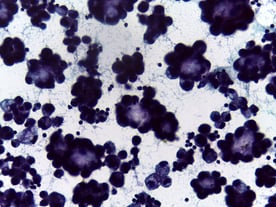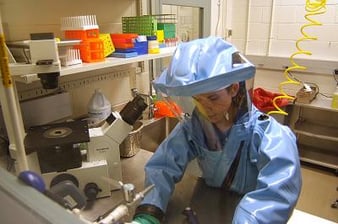The Human Computation Institute, in collaboration with UC Berkeley and other institutions, has developed a new game called Stall Catchers that will allow the public to directly contribute to research for a cure to Alzheimer's disease. In the online game, participants will view movies of real blood vessels in mouse brains and search for any clogged capillaries, or stalls. Capillary stalls, where blood is no longer flowing, are thought to be a key cause of Alzheimer's disease.
Read More
Tags:
CA,
University of California Berkeley,
California,
University of California,
Alzheimer's Research,
Southwest Region,
UC Berkeley,
Northern California BioResearch,
Alzheimer's Disease
The Laboratory of Neuro Imaging at the University of Southern California recently received a $21.7 million research grant from the National Institutes of Health to study epilepsy. Epilepsy is currently incurable, and the research team supported by the recent NIH grant will work toward finding a cure and developing treatments to prevent the condition.
Read More
Tags:
CA,
University of Southern California,
Epilepsy,
California,
USC,
Research Funding,
research grant,
NIH grant,
NIH award,
Southwest Region
(Article posted 2015 and updated in 2016)
Patients with a condition known as lung nodules may soon be breathing a bit more easily, thanks to research funding granted to the University of California, Davis and a new diagnostic technology tested in a 2016 study at the Morehouse School of Medicine and Emory University. Lung nodules are usually benign, small lesions often found in CT chest scans. While only 2% of these nodules end up being cancerous, they still require examination and monitoring to ensure the safety of the patient.
Read More
Tags:
CA,
Emory University,
University of California Davis,
cancer research,
California,
Cancer,
UCDMC,
BioResearch Product Faire Event,
Research Funding,
Sacramento,
Davis,
UC Davis - Medical Center,
research grants,
lung cancer
Seven UC San Francisco researchers have been awarded grants from the National Institutes of Health to fund innovative endeavors in biomedical research. The highly competitive awards include the Pioneer Award, the New Innovator Award and the Early Independence Award.

Read More
Tags:
CA,
University of California San Francisco,
new research funding,
California,
Research Funding,
UCSF,
NIH award,
Southwest Region,
research grants,
NIH grants
Dr. Gürol Süel, a Molecular Biology professor at the University of California San Diego, has been named a HHMI-Simons Faculty Scholar by the Howard Hughes Medical Institute (HHMI), the Simons Foundation, and the Bill & Melinda Gates Foundation. This prestigious distinction includes a $1.5 million award to support Süel's research study on how bacterial cells use electrical signals to communicate with each other.
Read More
Tags:
CA,
University of California San Diego,
California,
UCSD,
Research Funding,
UC San Diego,
research grant,
Southwest Region,
biofilms
The $3.3M research grant, given to a team of researchers at the University of Southern California, will support a project that will lead to improved treatment of craniosynostosis. Craniosynostosis is a birth defect that occurs in roughly one out of every 2,500 live births and in severe cases can lead to developmental delays, hearing loss, blindness, and even death.
Read More
Tags:
CA,
University of Southern California,
California,
USC,
Research Funding,
NIH grant,
Southwest Region,
BioResearch Product Faire™,
Birth Defects
Researchers from UCLA and partnering schools guided by Laurent Bentolila found evidence supporting the spread of malignant cells through angiotropism with vascular co-option, and even suggested they may be related or identical processes. These findings were published in Nature Scientific Reports. With angiotropism being the ability for cells to travel along surface of blood vessels, but not be inside of them, also called extravascular migratory metastasis (EVMM) and vascular co-option being the ability for a tumor to use a blood supply and travel along it, this means cancer has an outlet to spread outside of the bloodstream. The spread outside of the bloodstream means some current methods of treating cancer would be ineffective.
“... if the metastasizing cells are on the outside of the blood vessels, they escape exposure to the treatment and continue to spread cancer.”
-Laurent A. Bentolila
Read More
Tags:
CA,
University of California Los Angeles,
cancer research,
Los Angeles,
Cancer,
LAVS,
UCLA,
laboratory,
lab products,
2016
 According to the American Cancer Society, nearly 1 in 8 women will develop breast cancer in their lives, making it the second most common cancer for American women. However, breast cancer does not affect all women equally. Past studies have shown that women of African descent with breast cancer die at a higher rate than white women. Researchers at the University of Southern California Keck School of Medicine have received a grant of $12 million from the National Cancer Institute (NCI) to study the disparities in breast cancer in women.
According to the American Cancer Society, nearly 1 in 8 women will develop breast cancer in their lives, making it the second most common cancer for American women. However, breast cancer does not affect all women equally. Past studies have shown that women of African descent with breast cancer die at a higher rate than white women. Researchers at the University of Southern California Keck School of Medicine have received a grant of $12 million from the National Cancer Institute (NCI) to study the disparities in breast cancer in women.
Read More
Tags:
CA,
University of Southern California,
breast cancer research,
California,
USC,
BioResearch Product Faire Event,
NIH grant,
cancer research funding,
2016
 With the rise of infectious diseases, like the Zika virus and Ebola virus, research centered on these diseases has risen in importance over the last few years. The University of California, Irvine has become a leader in infectious disease research thanks to a prestigious designation by the National Institutes of Health (NIH). The high-containment biosafety level 3 training laboratory (BSL-3) at UC Irvine was recently designated as a National Biosafety & Biocontainment Training Center, making it the third such center in the United States.
With the rise of infectious diseases, like the Zika virus and Ebola virus, research centered on these diseases has risen in importance over the last few years. The University of California, Irvine has become a leader in infectious disease research thanks to a prestigious designation by the National Institutes of Health (NIH). The high-containment biosafety level 3 training laboratory (BSL-3) at UC Irvine was recently designated as a National Biosafety & Biocontainment Training Center, making it the third such center in the United States.
Read More
Tags:
CA,
University of California Irvine,
infectious diseases,
UCI,
UC Irvine,
2016,
BioResearch Product Faire,
Western,
Biosafety Training Center



 According to the
According to the  With the rise of infectious diseases, like the Zika virus and Ebola virus, research centered on these diseases has risen in importance over the last few years. The University of California, Irvine has become a leader in infectious disease research thanks to a prestigious designation by the National Institutes of Health (NIH). The high-containment biosafety level 3 training laboratory (BSL-3) at UC Irvine was recently designated as a
With the rise of infectious diseases, like the Zika virus and Ebola virus, research centered on these diseases has risen in importance over the last few years. The University of California, Irvine has become a leader in infectious disease research thanks to a prestigious designation by the National Institutes of Health (NIH). The high-containment biosafety level 3 training laboratory (BSL-3) at UC Irvine was recently designated as a